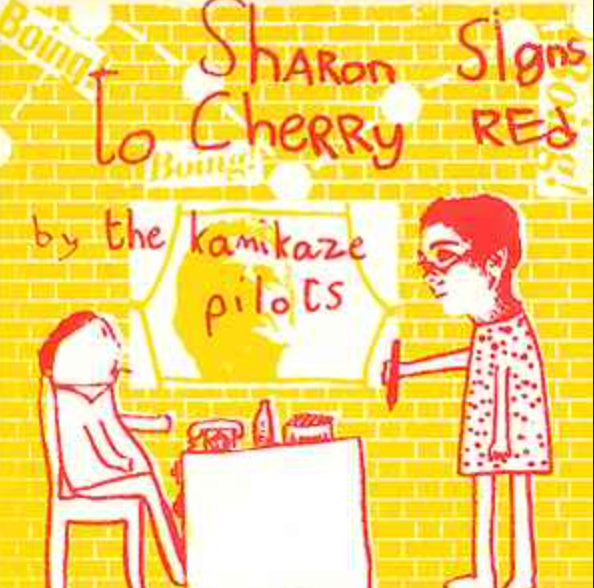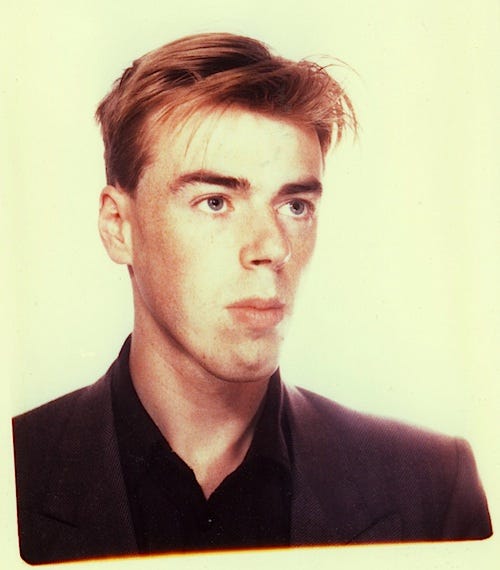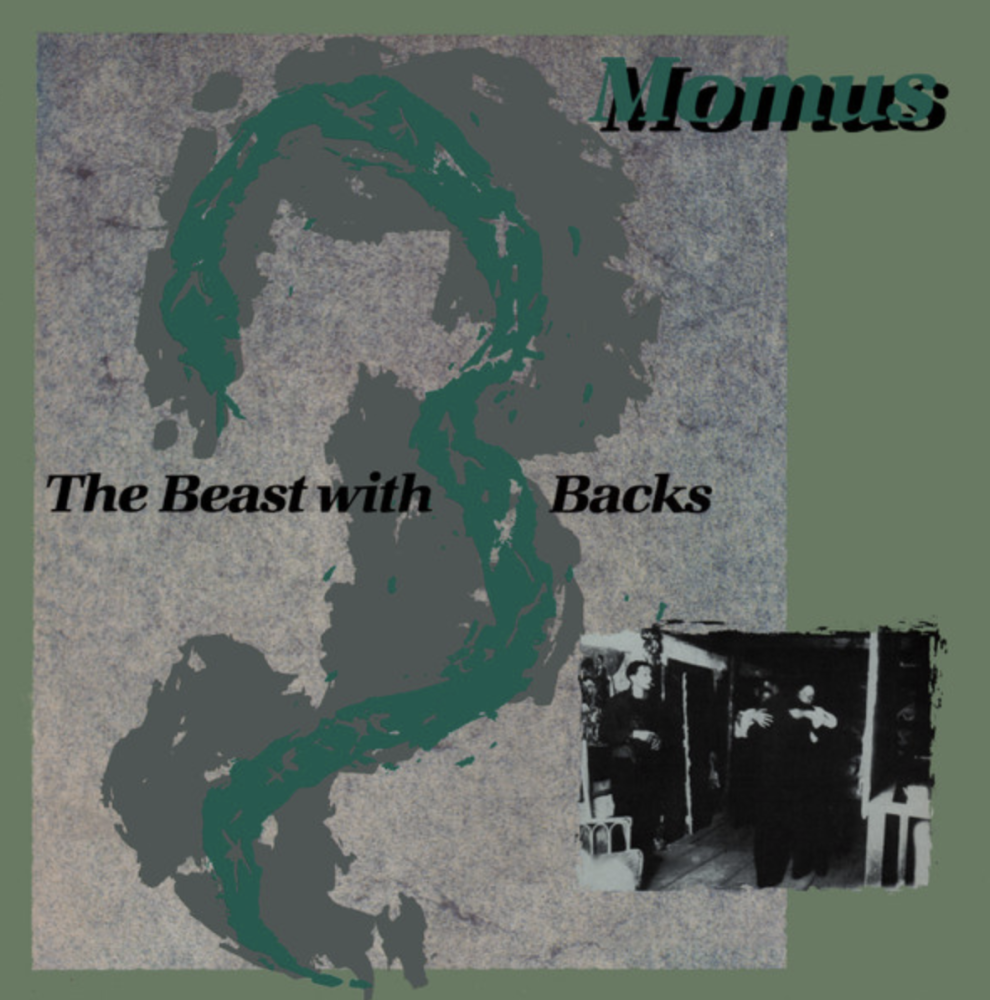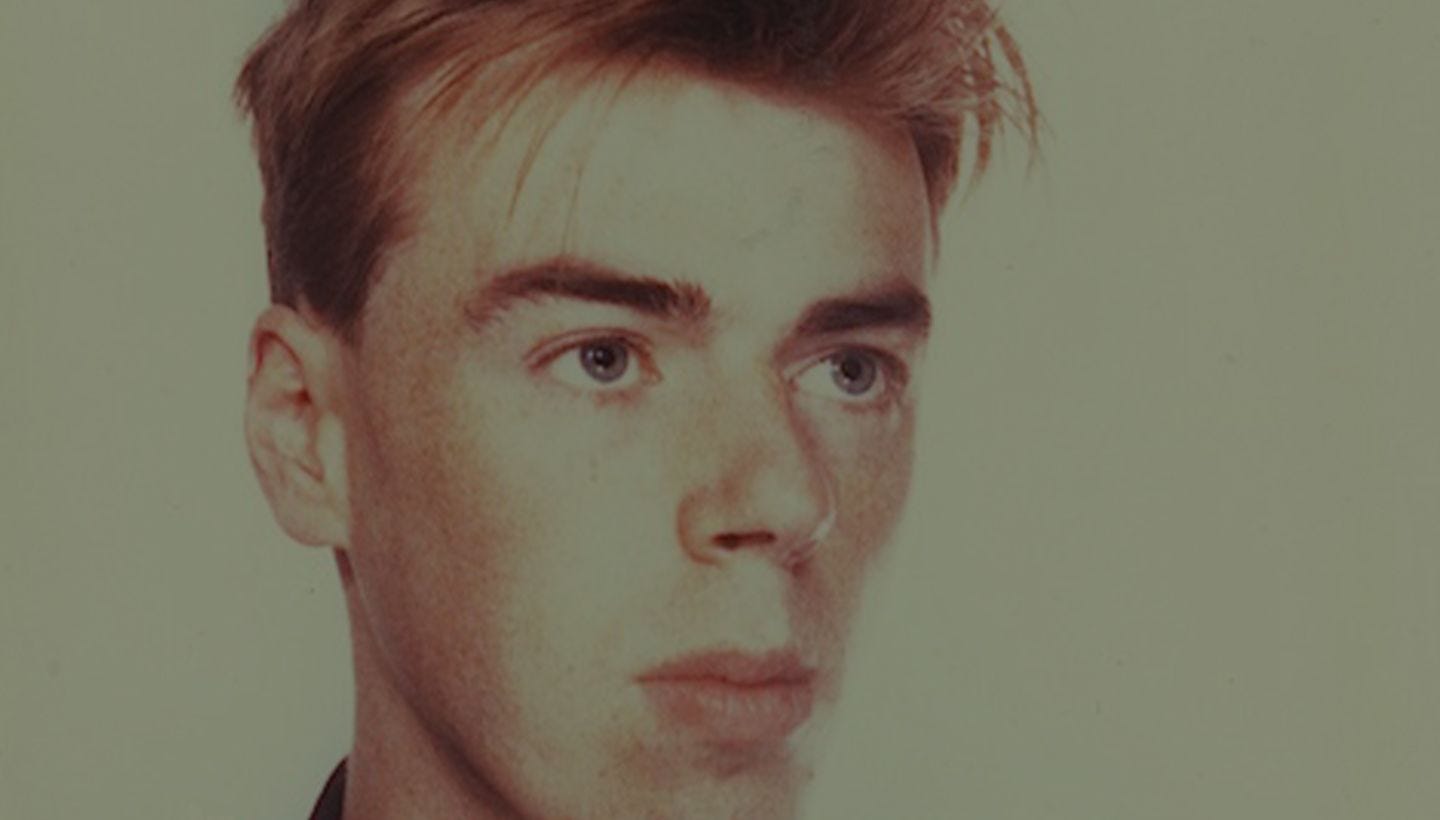MOMUS SIGNS TO CHERRY RED
by Nick Currie
Ah, signing to Cherry Red. The dearest ambition of every 1980s indie band! The ultimate goal for dynamic songwriting teams with world conquest on their minds!
A surefire soar to fame! Well, not quite.
The year I signed to Cherry Red — quite accidentally, when charismatic A&R man Mike Alway integrated his él label with them — there was a sarcastic song doing the rounds. It was by The Kamikaze Pilots and the title was Sharon Signs to Cherry Red. The titular Sharon is washing her hair one evening, her boyfriend interprets this as a rejection and commits suicide, and then Sharon, wracked with remorse, starts writing tortured and angst-ridden songs which catch the ear of a Cherry Red talent scout.
Sharon, wracked with remorse, starts writing tortured and angst-ridden songs which catch the ear of a Cherry Red talent scout.
The Kamikaze Pilots were, I suppose, mocking the kitchen sink Miserabilism of acts like Everything But The Girl. Perhaps there was even a dig at the folksy anger of Kevin Coyne, the articulate political dissatisfaction of The Passage (whose last release, the 1982 album Degenerates, had been my favourite record on the label), the strange electronic balladry of Eyeless in Gaza, the blurred funk of Thomas Leer, or the glum, pretty mumblings of Felt. It was odd that these bedroom satirists hadn't picked a more obviously melancholic target like Factory or 4AD.
 Ah, Factory and 4AD! Now those were labels you wanted to be on. My first band, The Happy Family, had sent out just five demo tapes. One, to Fiction, landed us our first gig, supporting The Cure at the Edinburgh Odeon. The letter we sent Factory was ignored, but 4AD wrote back saying we should meet up and discuss putting out an EP. Cautiously — because Peel didn't like us, and journalists didn't think we were as good as Josef K, our ancestor group — Ivo Watts-Russell proposed extending the deal to an LP. Precisely because the gloomy 4AD aesthetic had become a bit of a cliché by 1982, I rejected the proposed 23 Envelope sleeve and did my own, a mishmash of expensive photos of the earth from space, blurred video captures, sinister drawings and references to 1960s musicals.
Ah, Factory and 4AD! Now those were labels you wanted to be on. My first band, The Happy Family, had sent out just five demo tapes. One, to Fiction, landed us our first gig, supporting The Cure at the Edinburgh Odeon. The letter we sent Factory was ignored, but 4AD wrote back saying we should meet up and discuss putting out an EP. Cautiously — because Peel didn't like us, and journalists didn't think we were as good as Josef K, our ancestor group — Ivo Watts-Russell proposed extending the deal to an LP. Precisely because the gloomy 4AD aesthetic had become a bit of a cliché by 1982, I rejected the proposed 23 Envelope sleeve and did my own, a mishmash of expensive photos of the earth from space, blurred video captures, sinister drawings and references to 1960s musicals.
The Man on Your Street — a tragi-comic concept album about terrorism, bless! — stiffed, and only one man in the world seemed to care: Mike Alway, A&R man at Cherry Red. A good friend of Ivo's, Mike was also the manager of The Soft Boys (Robyn Hitchcock's band). This shaggy-haired, smiley, talkative fantasist — boyish in baggy shorts — popped up with suspicious frequency at the pub across the road from 4AD's Earl's Court headquarters. It was as if Ivo had bequeathed us to him.
It was to be several years before Mike and I finally pulled together a context for Momus, the solo artist I became after finishing my English degree at Aberdeen University. A skirmish with Warners — a sublabel called Blanco Y Negro — had backfired on Mike. In an epic act of betrayal he'd brought the major half the acts he'd signed to Cherry Red, only to be kicked out himself when he spent a minor fortune on the artwork for a Sudden Sway album destined to sell about six copies. When I moved to London in 1984 he was in straitened circumstances, working from his kitchen in Barnes, with nothing much left but his fantasies and the idea for a label — named, of course, after a film by Luis Buñuel — called él. I was drafted in to write a brochure advertising the delights of an imprint which would feature Vic Godard crooning in a tux, actor Simon Turner, Bid from the Monochrome Set, Louis Philippe, a pastry chef and philosophy student from France, and myself. "The most westerly of the indies," I decided to call the prospective label, where "one man's martyrdom" could be "another man's matinée".
On November 14th 1984 I wrote to my girlfriend: "This afternoon I got your two weekend letters, the crackpot multi-coloured one and the moralistic one with the parable of My Dinner with André. Strangely enough I was thinking of that title yesterday (I haven’t actually seen the film). I had to find a group name, and was substituting things like "In Praise of…" and "My…" for the dull definitive article. This peculiar recreation was the result of a phone call to Mike Alway of él Records: he’s about to sign a licensing deal with MCA Records, and has promised me studio time for a demo before the end of the year. I think I’ll name myself Momus, after the Greek god who was banished from Olympus for criticising Zeus’ decision to put the bull’s horns on its head rather than its shoulders (where it is strongest) and for failing to install a window in the breast of man, through which his thoughts and feelings could be surveyed. Somehow the comedy of this pathetic coup can still be heard in his ridiculous name."
 The mooted MCA deal fell through, but Mike managed to scrape together some money from a Belgian clothing shop called Himalaya, and I was packed off to Brussels to record an EP called The Beast with 3 Backs. It would be the first release on él. In February 1985 I reported to Leentje (my girlfriend, half-Belgian herself):
The mooted MCA deal fell through, but Mike managed to scrape together some money from a Belgian clothing shop called Himalaya, and I was packed off to Brussels to record an EP called The Beast with 3 Backs. It would be the first release on él. In February 1985 I reported to Leentje (my girlfriend, half-Belgian herself):
"If you want to know what my life has been these last two months, listen to my songs. A lot of time has slipped away through the curly vents of my guitar, and without it God knows what state of suffocation and strangulation I could now be in. And at last I’m beginning to move this most important hobby and therapy towards a money-making, public commodity (commonplace oddity?) without which it could wither. The Beast with 3 Backs comes out next month, and I really expect some notice to be taken of it, at least by a couple of critics. Then a month or so after that another three songs, Momus Sings the Old Testament to the New Instruments, will appear. In a week or so I’ll start playing live (the first gig will be in front of businessmen in Richmond at lunchtime; I hope to put them off their food) – just me and a stool, a black tie and a guitar, Rive Gauche style. Reaction to the Brussels tape has been extremely good, especially to the ballad (that nasty one about making love at gunpoint, now much more stark and chilling)."
The Old Testament project turned into the first Momus album, the very Brechtian Circus Maximus, recorded using a "new instrument" in the shape of the Emulator 2, a cut-price Fairlight. Mike Alway, however, had different ideas, as I told Leentje:
"Mike has proposed an LP set and made in Spain! As an offshoot of a licensing deal with a Spanish company, he can get free studio time in Madrid. He suggests that I go to various sites in Spain – castles, gardens, mountains, towns – write a piece of music in each, and record them in Madrid. The record could be called something like Momus in the Gardens of Spain. As you can imagine, I’m blissful at the prospect… Mike also promises money soon – he’s about to get a deal from Virgin Records for all his artists. He says I could get a couple of thousand right now, but if the single is well-received, much more in a month or so. Is Mike all talk and no action? We’ll have to wait and see. Anyway I like his optimism. He’s a live wire, you can’t get a word in edgeways with him, he sits in his kitchen in Barnes (a rather Enid Blytonish district where the composer Holst lived) making 20-minute phone calls. He’s a fan of Ealing Comedies and suggested to me that I make a radio play record in that style, on the subject of a small business battling, with only pluck and native cunning, against multinational interests. 'I’m not sure about the politics of that', I said, severing the string from which this extremely tempting carrot hung."
In the end Mike patched things up with his old employers, Cherry Red. Instead of visiting him in his kitchen at Barnes, one would meet up in a pastry café called Etoile on Westbourne Grove. Mike would drink black coffee while the artist would be offered a chocolate éclair from the glass display cabinet and scoff it with grubby dignity while Mike read through various absurd scenarios printed out in his odd heraldic handwriting:
– A SILLY, POMPOUS IAN CARMICHAEL-LIKE CHARACTER TAKES OVER A SCHOOL CHOIR IN INDIA
– MARY POPPINS, BUT AS IF MICHAEL POWELL HAD DIRECTED IT
– EDITH SITWELL READING CRICKET COMMENTARY IN THE BATH
– FAMOUS BULLFIGHTERS, ALL PLAYED BY ALEC GUINNESS

– PASSPORT TO PAMPLONA
– THREE MEN IN A BOAT ON AN AMAZON RAFTING EXPEDITION
– MR POLLY OPENS A GROCERY ON THE MOON
After the artist had rejected all these ideas and proposed something completely different, it was time for a quick trip up to the Cherry Red offices at Kensington Gardens Place, where the kindly but vague Iain McNay — at the time sporting a straggly peroxide hairdo, New Age hippyish — would send one in for a talk with unctuous, avuncular Theo Chalmers, in charge of song publishing at a sister company called Complete. Then there would be an opportunity to raid the record cabinets for freebies.
Yes, somehow Momus — just like the angst-ridden Sharon in that song by the Kamikaze Pilots — had signed to Cherry Red. In store was a long and gorgeous plummet towards oceans of obscurity.



